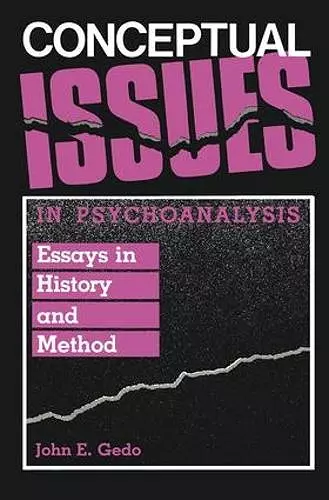Conceptual Issues in Psychoanalysis
Essays in History and Method
Format:Paperback
Publisher:Taylor & Francis Ltd
Published:21st Jan '19
Currently unavailable, and unfortunately no date known when it will be back
This paperback is available in another edition too:
- Hardback£54.99(9780881630503)

In Conceptual Issues in Psychoanalysis, John Gedo's mastery of Freudian theory and broad historical consciousness subserve a new goal: an understanding of "dissidence" in psychoanalysis. Gedo launches his inquiry by reflecting expansively on recent assessments of Freud's character. His acute remarks on the intellectual and personal agendas that inform the portraits of Freud offered by Frank Sulloway, Jeffrey Masson, and Peter Swales pave the way for his own definition of psychoanalysis in historical context. Then, in topical studies on Sandor Ferenczi, Melanie Klein, and Heinz Kohut, he explicates the commonalities that bind together three generations of dissidents, each of whom undertook to supplant the edifice of hypotheses erected by Freud with alternative theories. Interspersed with these essays are quite insightful studies of Lou Andreas-Salome and David Rapaport, whom Gedo sees as "epistemological referees" attempting to reconcile viewpoints unique to their generations.
In the second part of the book, Gedo argue that analysis now has the opportunity to move beyond this pattern of dissidence followed by mediation by drawing on observational research about infancy and early childhood to validate or refute its clinical hypotheses. In these chapters, Gedo offers critical commentary on recent efforts to extrapolate from infant research to the psychoanalytic theory of development. Only then does he offer his own measured estimation of the "legacy of infancy and the technique of psychoanalysis." This review of "the challenge of scientific method" as it bears on analysis culminates in concluding chapters that probe the status of analysis as a hermeneutic discipline and the contribution of analysis to "vocabularies of moral deliberation."
"Laced with priceless personal detail and a humanistic appreciation of the makers of theory and their motives, Gedo transforms an erudite discussion of principles into a gripping adventure story."
- Lawrence Friedman, M.D., Weill Cornell Medical College
"This is a unique guide-book to a controversy that absorbs all clinicians. In a masteful overview of psychoanalytic history, Gedo deftly portrays landmark efforts to take account of the adult impact of preverbal forms. He shows how those efforts were inspired but also limited by the clinical evidence then available, requiring mediation by philosophically sophisticated theorists, while that evidence is now richly supplemented by infant research. Gedo warns about faulty approaches to infant observations, and suggests how, properly used, it makes otherwise unreachable problems accessible to treatment. As a pioneer clinician and theorist, Gedo is himself a central figure in this historic pageant, and because he holds back neither passion nor artistry, his account has the insider's special clarity about what it at stake. Laced with priceless personal detail and a humanistic appreciation of the masters of theory and their motives, Gedo transforms an erudite discussion of principles into a gripping adventure story."
- Lawrence Friedman, M.D., Clinical Professor of Psychiatry, Cornell University Medical College
"Gedo writes with rare erudition, lively imagination, and a passionate devotion to the fit of his ideas and deeds one with the other and with those of others. He deserves recognition as analyst, humanist, scientist, philosopher, moralist, illuminist, raconteur, and fire setter. If you like Freud, Erasmus, early Emerson, Thoreau, and maybe Mencken, try Gedo."
- M. Robert Gardner, author, On Trying to Teach (Analytic Press, 1997)
ISBN: 9781138872141
Dimensions: unknown
Weight: 453g
256 pages